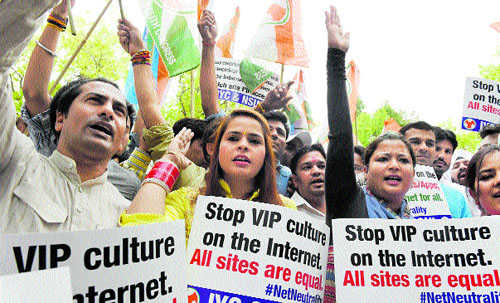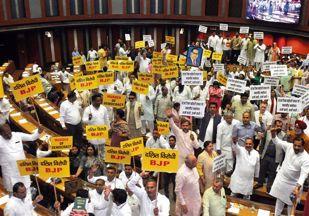
Private companies can’t be allowed to become gatekeepers of the Internet.
Sushma Ramachandran
WHEN it launched the process of consultation over differential pricing for Internet use, the Telecom Regulatory Authority of India (TRAI) did not expect that it would set off a full-scale war of words over net neutrality. On December 12, it had set a deadline of December 30 for stakeholders to respond to its question on whether such differential pricing should be allowed. It asked whether these platforms could end up acting as gatekeepers of the Internet, stifling innovation and access to smaller websites who are unable to join these platforms. It also questioned whether alternative models were available to provide free Internet usage to consumers.
The questions did not mention Facebook’s new concept of Free Basics. Even so, it provoked Facebook to launch a media blitz and a spate of full page newspaper advertisements at a reported cost of Rs 300 crore, defending the proposal. It also asked Facebook users to support it. In turn, net neutrality activists fired off a campaign arguing vigorously against Free Basics. The result is that the telecom regulator has got millions of responses to the question of whether they supported Free Basics. This was not, however, the question being asked which was about differential pricing issues. The regulator has extended the deadline and may ask Facebook supporters to reply to specific questions. Meanwhile, the media battle shows no signs of easing.
First, one must explain what is Free Basics. Simply put, it is a scheme to offer free broadband Internet access to people who cannot afford to pay for this facility. This sounds like a wonderful idea. But as the cliché goes, there is no such thing as a free lunch. The catch is that this free facility does not allow the user to access the entire Internet. Instead, the user can only view websites approved by Facebook. So, it becomes a limited Internet access. Besides, websites may have to pay to be on this platform. This is bound to affect the visibility of startup ventures which cannot afford such payments. What is of even greater concern is that the entity approving the websites is a private company which has no motivation to take public interest into account.
One of the analogies given by net neutrality activists to describe this concept is that it is like a taxi company deciding which type of passengers can travel in their cabs. In other words, Internet carriers will be able to decide on the content to be viewed by users.
Apart from Facebook, Airtel in India and some telecom companies abroad have also mooted similar concepts offering differential pricing for Internet access. These proposals envisage that the carrier provides a limited number of sites for users who want to pay less than the regular tariffs. It is for this reason that TRAI decided to launch the consultation paper and seek proposals on how Internet access can be given free of charge to people who are not able to afford it.
In this context, one must understand the concept of “net neutrality” as it is central to the entire debate. It is defined as the principle that the Internet service provider should allow access to all content and applications regardless of the source and without favouring or blocking particular products or websites. In other words, net neutrality means that one should be able to view everything on the Internet without any hindrance. The Free Basics proposal violates this concept of net neutrality.
At the same time, there are those who argue that Free Basics or similar schemes are needed to give access to the poverty-stricken millions who will otherwise be denied Internet facilities and all their related opportunities. A limited Internet access is better than no Internet at all, they argue. Besides, they point out that the government has done nothing so far to make Internet usage an essential service for the masses like health or education. In such a scenario, they feel that private Internet service providers should be allowed to offer a variety of schemes.
On the other hand, there are clearly other options to provide cheap or free Internet rather than allowing private companies for whom profits are the primary goal of existence, to become gatekeepers of the Internet. This becomes all the more necessary when it becomes clear that in Free Basics, the company can have access to all the user’s personal data while surfing this corporate version of the Internet. One alternative could be to provide a tiered system of broadband access with cheaper versions available for those who cannot afford the more expensive versions with higher capacity. Some service providers are already offering three-month free Internet use to new users. This in effect becomes just like Free Basics as Facebook claims that most of those using their product switch over to the paid version of the Internet after a month.
Another method being suggested is that cheap 2G services be offered as telecom companies have already mopped up enough revenues from this segment. In all these options, new users would be able to access the entire Internet rather than a limited censored version of it.
For the time being, TRAI has suspended the Free Basics service which was being offered by Facebook in a tie-up with Reliance Communications. Earlier versions of the same proposal called internet.org and Airtel Zero, which were launched last year, have already been shot down by the regulator. While taking a view on differential pricing, it will have to consider that Free Basics has been accepted only in some countries like Nigeria, Gabon, and Congo. Egypt has already banned it while the communications regulator in the US has not accepted similar proposals for differential pricing by service providers like AT&T and Comcast.
The fact is that social media behemoths like Facebook could only have been created by the Mark Zuckerbergs of the world because of access to an open Internet. These same institutions are now trying to become censors of the Internet for poor people in developing countries. Far being a social good, this concept is clearly rather diabolic in its intent. One can only hope that TRAI takes the wise decision of shutting down such services as soon as possible.



























